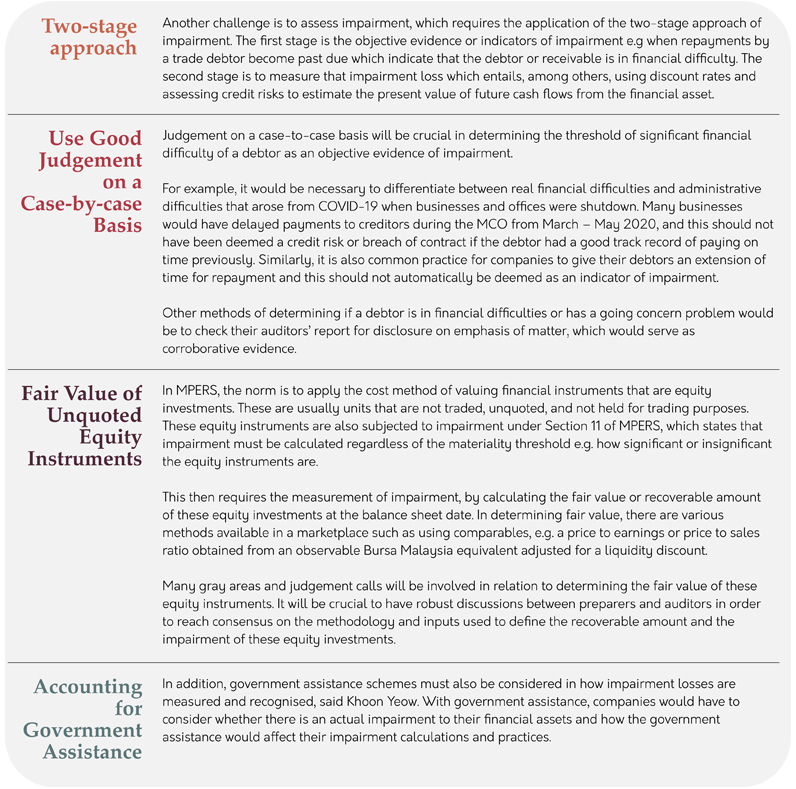By Nazatul Izma
MIA’s first e-book – the Interactive e-Book of the MIA Illustrative MPERS* Financial Statements, with Commentaries and Guidance Notes (MPERS Interactive e-Book) is especially relevant in the light of the uncertainty caused by the COVID-19 pandemic which affects every business, including SMEs. The COVID-19 pandemic is an unprecedented and unusual event and it has significant accounting implications for SMEs. These include going concern assessment, cessation of operations or business segments, impact on revenue recognition, impairment of assets, furlough of employees, as well as other consequential impacts, such as cancellations of contracts with customers and delays in satisfying performance obligations to customers.
This e-Book will be very helpful in guiding both preparers and auditors to understand and accordingly address the impacts of these issues on the MPERS financial statements.
To support the launch of the e-Book, a panel session was held on the “Impacts of COVID-19 on MPERS Reporting Entities and MPERS Updates”. The panel featured Tan Liong Tong, the lead author of the e-Book, as well as Tan Khoon Yeow, Partner, Learning & Development, BDO and Danny Tan, MIA Trainer and Project Manager with MASB on Financial Reporting by Small and Medium Entities who both collaborated on the e-Book. Rasmimi Ramli, Deputy Executive Director, Digital Economy, Reporting and Risk, MIA moderated the panel.
The following are highlights of the panel session:
Overall Issues Worrying Preparers and Auditors
In a snap poll of the participants at the launch, 77.5% ranked Going Concern as the most worrying financial reporting implication of the COVID-19 pandemic, followed by Impairment of Non-Financial Assets (10.2%), Impairment of Financial Assets (4.1%), Events after the End of the Reporting Period (4.1%) and Presentation of Financial Statements (4.1%).

Going Concern
Liong Tong spoke extensively on the going concern assumption to allay the concerns of preparers and auditors. With the economy in distress due to the COVID-19 pandemic, one of the most crucial tests in financial reporting is the going concern assumption i.e. whether a reporting entity would be able to continue to operate its businesses as a going concern or whether it needs to be liquidated or restructured.
When management has decided to shut down or cease business, the financial statements can no longer be prepared on the going concern basis, but must be prepared on the break-up or liquidation basis where assets are measured at net realisable values and liabilities at settlement values.
The assessment of the going concern requires judgement. Some of the indicators that a reporting entity might face on the going concern issues include: current liabilities exceeding current assets; insufficient cash to meet short-term obligations; a high debt-to-equity ratio with debts maturing in the near future; huge accumulated losses; and negative shareholders’ equity i.e. the entity is technically insolvent.
Notwithstanding these adverse conditions, the financial statements of a reporting entity might still be prepared on the going concern basis if its management concludes that there are reasonable and supportable assumptions to support it. However, it needs to disclose the uncertainties and the judgements applied, including financial support from creditors and shareholders.
Impairment of Non-Financial Assets
Impairment of non-financial assets is subject to the requirements of Section 27 of the MPERS and the scope of assets subject to this include inventory, property, plant and equipment, investment property (cost model) as well as goodwill and identifiable intangible assets, among others.
Currently, one of the most difficult challenges with regard to impairment of non-financial assets is the confusion of indicators of impairment with events after the end of the reporting period, or hindsight. It is appropriate to exercise hindsight in assessing going concern. However, a key challenge is to refrain from applying too much hindsight in making that decision on impairment. According to paragraph 27.7 of the MPERS, the indication of impairment, whether it is internal or external, must be assessed at the entity’s reporting date.
In MPERS, the test for impairment is required only if there is any indication of impairment. Amid the COVID-19 pandemic, evidences of impairment are likely to be triggered by internal sources (such as losses, lower than expected returns, closures or suspensions of operations, restructuring, etc.) and external sources (adverse effects brought about by the crisis, such as declining commodity prices, falling demand for entities’ goods and services, changing consumer preferences, increase in discount rates that are caused by increase in market risk, etc.).
Assumptions and inputs used in the previous impairment tests (tests performed prior to the COVID-19 crisis in 2019 or earlier) need to be revised and updated to reflect the current conditions of the assets and fluid uncertain environment. Fair value less costs to sell will be impacted negatively due to declining prices of most assets. Similarly, value-in-use calculations would need to factor in the effects of suspension or curtailment of operations (declining revenues) and changes in the discount rates.
Impairment of Financial Assets

Additional Disclosures When Necessary
MPERS Section 3.2 states that the application of MPERS with additional disclosure when necessary, is presumed to result in fair presentation of financial statements. Such an additional disclosure is necessary when compliance with a specific requirement of the MPERS is insufficient to enable users to understand the effect of a particular transaction or event, advised Danny Tan.
For example, an item of inventories was not impaired at period end because the net realisable value was determined to be above cost based on best information available as at that date. However, the same item of inventories was sold for below cost after the period end but before financial statements were authorised for issue, and assuming this is due to an event that is indicative of condition that arose after the end of reporting period, the item of inventory is not impaired, but a disclosure is required in accordance with Section 30.10. If the disclosure requirements in Section 30.10 is insufficient for user to understand the impact of the above event, additional disclosure in accordance with Section 3.2 will need to be considered. Auditors and preparers are required to exercise judgement in deciding the extent of disclosures, which could be none, if the above event is assessed to be immaterial (see Section 10.3), explained Danny Tan.
Amendment to Companies Act 2016 and Impact on Financial Reporting
This is unrelated to the issues of the COVID-19 pandemic but an update of the MPERS Illustrative Financial Statements. According to Liong Tong, the key amendment in the Companies Act 2016 (CA 2016) that would impact on financial reporting relates to the redemption of preference shares out of capital.
The CA 2016 S72(4) specifies that preference shares are redeemable only if they are fully paid up and the redemption shall be out of profits, a fresh issue of shares, or capital of the company. The redemption out of capital is a new provision in the Act.
Under the original Companies Act 1965, preference shares were deemed redeemable, only if they are fully paid up and the redemption shall be out of profits or out of the fresh issue of shares. In addition to these two conditions, the CA 2016 S72(4) enables redemption out of capital of the company.
The CA 2016 requires capital maintenance for redemption of preference shares out of profits. The CA 2016 S72(5) specifies that where the preference shares are redeemed otherwise than out of the proceeds from a fresh issue of shares, a sum equal to the amount of the shares redeemed shall be transferred into the share capital accounts, out of profits that would otherwise have been available for dividend. “This capital maintenance applied equally to redemption out of capital,” clarified Liong Tong.
However, in practice, there were divergent views on whether or not capital maintenance applies equally to redemption of preference shares out of capital, as some viewed this as being unnecessary.
Hence, the Companies (Amendment) Act 2019 amended S72 of the principal Companies Act 2016 to require capital maintenance on redemption of preference shares, only if the redemption is out of profits. “This means that when preference shares are redeemed out of capital, capital maintenance is no longer required under subsection 72 (5) of the principal Act, so long as the solvency requirements of the Act are met.” In other words, there is no need to transfer an equivalent sum from profits to share capital and this would enable companies that have losses to redeem preference shares out of capital, concluded Liong Tong.
* MPERS refers to the Malaysian Private Entities Reporting Standard.







